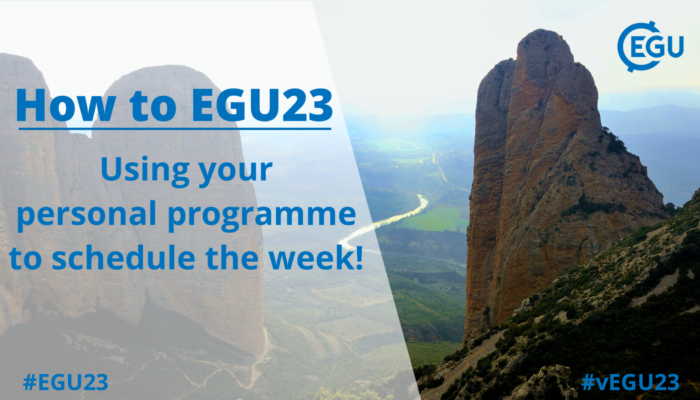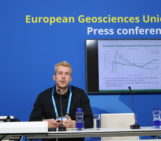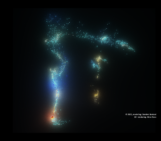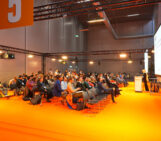
Now that you have had a quick look at our programme for EGU23, maybe found your abstract or session, you probably have a few questions! This year’s scientific programme of the General Assemby includes Union-wide Sessions, such as the medal lectures, great debates, short courses, education and outreach sessions, as well as townhall and splinter meetings, just to name a few.
The Disciplinary Sessions and Inter- and Transdisciplinary Sessions (ITS) encompass the oral, poster and PICO sessions covering the full spectrum of the Earth, planetary and space sciences, all available this year in a hybrid format – both virtual and on-site.
There are several ways to access the programme, so you can explore the sessions with ease:
- Browse by day & time: view the oral, poster and PICO sessions by their time and location, each sorted chronologically by conference day, time block and programme group, select the day and time block you wish to view
- Browse by session: view the scientific sessions and their oral, poster and PICO sub-sessions by programme group
- Session schedules by Programme Group: online view of the oral, PICO, and poster sub-sessions of a selected programme group listed by day and time block (sessions with multiple time blocks are listed repeatedly).
- Personal programme: a great tool to generate your own personal programme, just select the specific presentations or sessions you’re interested in to create your own personal schedule
- Abstracts of special interest: a list of abstracts which are of particular interest for the public. This selection was compiled by the session conveners.
So what else do you need to know about the #EGU23 programme!
What does it mean for my abstract/session to be scheduled?
The scheduled abstract time in your session is the time during which you will be required to give your live presentation. Don’t forget you need to upload your presentation file at least 24 hours before your session, to allow the conveners to have all the slides ready to go – regardless of what format you are presenting in (PICO, oral or poster; virtual or on-site). For oral presenters and PICO presenters your time represents the specific time in your session that you must present, for PICO presenters this is the 2 minute summary presntations you give before you head to the interactive screens for the longer in-depth discussion times. For poster presenters the time you are given is the period that you must stand by your poster (either virtually or on-site) to present it, which may also look like the whole session time. Any questions about your schedule, please contact your session convener as soon as possible, or email egu23@copernicus.org.
Can I still create a personal programme?
![]() Absolutely! The personal programme option is a great way to organise all the sessions you are interested in. The personal programme allows you to add either entire sessions or individual abstracts to keep track of your most important topics. You can add an item to your personal programme by clicking the yellow star next to the abstract or session. One thing to bear in mind is that the personal programme will only be able to list times in CEST – but during the week of the General Assembly you will also be able to click an ics link that will import your session or abstract into your own calendar – which will automatically translate it into your time zone.
Absolutely! The personal programme option is a great way to organise all the sessions you are interested in. The personal programme allows you to add either entire sessions or individual abstracts to keep track of your most important topics. You can add an item to your personal programme by clicking the yellow star next to the abstract or session. One thing to bear in mind is that the personal programme will only be able to list times in CEST – but during the week of the General Assembly you will also be able to click an ics link that will import your session or abstract into your own calendar – which will automatically translate it into your time zone.
What about the schedule time zone?
As EGU23 will be taking place in central Europe the time zone for the conference is in CEST – Central European Summer Time. The conference schedule has been set into very specific time blocks to help you manage your discussions, whether they happen on-site or virtually. These regular time blocks will help you manage your time and move between the presentations, regardless of their format or location with ease.
| 8:30-10:15 | First morning session (Time Block 1) |
| 10:15-10:45 | Break |
| 10:45-12:30 | Second morning session (Time Block 2) |
| 12:30-14:00 | Lunch |
| 14:00-15:45 | First afternoon session (Time Block 3) |
| 15:45-16:15 | Break |
| 16:15-18:00 | Second afternoon session (Time Block 4) |
| 18:00-19:00 | Networking time (Time Block 5) |
| 19:00-20:00 | Medal lectures, townhall meetings and evening events (Time Block 6) |
Will there be additional online materials again?
Yes! Once again we are encouraging our authors to upload online materials to be shared virtually on your abstract page. In the past we have called these display materials, but from now on they will be called supplemental materials. Watch the following video from last year which explains how these materials work!
One of the things our attendees really loved from the virtual formats we have run so far was the ability to comment on scientific content outside of the presentation time, so this is something we have kept . You can comment on a supplementary materials any time from when they are uploaded through to the end of May 2023.
I’m joining virtually and I’m worried about juggling my responsibilities during the week, including childcare and caring responsibilities. What do I do?
Firstly, we acknowledge how difficult it is to attend a virtual conference, even when you are just worried about juggling your working responsibilities. We really hope that you will be able to be kind to yourself this week and, where possible, focus only on attending vEGU23 – just as you would if you were attending in Vienna. And yes. that also includes taking some time out to explore and go for walks, talk with friends and colleagues and enjoy (hopefully) the late April weather. In Vienna you are not constantly in the conference centre for the full week, and we hope you will be able to let yourself not constantly be working during EGU23 as well.
Other top tips for making an online conference easier:
- Take regular breaks! This can mean doing something that isn’t work related, or even stepping away from your computer altogether.
- Keep a pad and pen nearby to doodle on while you listen – let yourself fidget. Research suggests that letting yourself fidget whilst you listen can actually help you focus and remember more, so if you want to doodle whilst you listen – do it!
- Schedule varied events. Once you have added your key sessions and abstracts into your personal programme, why not consider adding some more varied events? During the week of EGU23 you will be able to add and attend pop-up networking events, from Division social events to short presentations by our Artists in Residence. As usual the Union Symposia and Great Debate sessions will be streamed live and you will also be able to participate in a number of short courses! Adding varied events to your schedule will give you a chance to focus your attention in different ways over the ten days of the meeting.
- Be ruthless to the schedule but kind to yourself. We at EGU know how easy it is to get excited when the programme is released and there are so many exciting sessions you want to attend, but remember – these events are very tiring to attend and you have to take care of yourself – so be conservative with adding events to your calendar and ruthless if you need to cut some out. Similarly, to ease the burden, you should try not to attend more than one session simultaneously. You would not be able to do this in Vienna, don’t feel like you have to do it now.
For people who have caring responsibilities, in 2021 we spoke with two of our Division Presidents, Ira Didenkulova and Dan Parsons, who have experienced attending an EGU General Assembly whilst caring for young children about what they suggest for balancing caring with attending a virtual conference, but we would also very much appreciate any tips or advice any of you have to share.
My partner is also in research, so we plan our weeks in advance, so that one takes over the kids, while another needs to be at a conference/seminar. Obviously, it does not always work for both of us, but is more of a survival kit. Cleaning the house is also a challenge – we clean the house only every couple of weeks…! Toys are more often than not lying around. When my partner reaches his limit, he collects them into the box and hides them somewhere for a while.
And… unless it is something special, when I should concentrate very much, I let the kids run around and get involved if they want to watch my zooms. Then either they become bored and soon leave, or they start to play in something of their own, so I can work nearby.
In the worst case scenario, when both of us are busy and the kids ask for attention, we use cartoons! I am trying to keep it at the level of not more than once a week, so this is our emergency solution for critical days. I have my own selection of downloaded, approved cartoons and use a projector and a big screen. So, they have kind of a cinema! Another emergency solution is to re-discover the box of hidden toys after some weeks or even months. This gives an excitement for several hours, so practically saves a day!
Ira Didenkulova, Natural Hazards Division President, 2021
Managing the workload of attending a virtual conference with all the other pressures of life during a pandemic is not easy, particularly when you have a 4 year-old, a 10 and 12 year-old all at home – as was the case during EGU20! ….and I was really lucky to be heavily supported by my wife, Katie. I know that many would have had less support making it even harder to juggle things. It was difficult getting to see all the sessions as well as keeping the children home-schooled and entertained. My wife, who is in the middle of her PhD, and I did a tag-team around the most important sessions I wanted to see last year and around the important times and parts of being a Division President. Overall, although I felt like I missed so much great science the fact that the resources were all available outside of the session times meant that I was able to catch up with things I would undoubtedly missed if I was in Vienna in a normal General Assembly.
So … what have I learnt? First, have a listing of those sessions you want to see most – prioritise – gold, silver and bronze or similar. Second, try not to worry if you miss things – I miss things all the time in Vienna, and at [EGU23] you can find the content afterward and follow up with the authors in the networking space. And finally, you can go to a conference in your pyjamas….take advantage of that!
Dan Parsons, Geomorphology Division President, 2021
We will continue to add more information about EGU23 over the next few weeks and are looking forward to having you join us either in Vienna or online, very soon!




